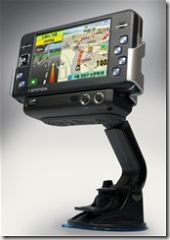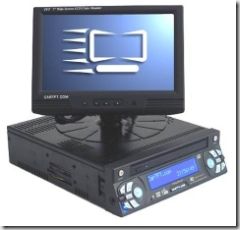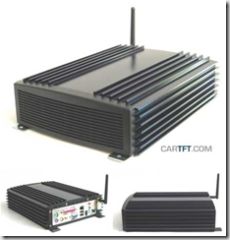Part 1 is here.
The ultra mobile PC as a Carputer
So will the ultra mobile PC make a good carputer? Has it got all the elements of design, aftermarket support, software and value to make it the ideal candidate or are there other, better, cheaper options?
Lists are always good so here’s a brain dump of requirements for a Carputer.
- 5-7″ light-touch screen. (8″ and more gets too big for in and on-dash mounting in most cars. Trucks and lorries are a different matter. *1)
- Mounting solutions
- Dual-head capability (videos in the back, navigation in the front.)
- CPU power for the latest navigation and overlay software
- Windows XP base OS. (navigation support on Linux is almost non-existent. Most overlay software is for XP)
- Bright screen
- Large disc for video library
- Bluetooth A2DP support
- Audio-out
- Programmable buttons
- Removable (for security.
- Lightweight (unless being built in)
- 10-15V DC input capability
- Auto shutdown
- Auto startup? (you need external hardware for this but I think you can use the WOL header or wake on keyboard signal somehow)
- USB port for peripherals (Cam, GPS, remote control)
- Built in GPS (although some cars need a remote GPS solution due to UV filters in the screen.)
- 3/3.5G Cellular radio (depending on mobile phone. Tethering is possible via Bluetooth.)
- Remote control.
Now lets list some of the devices we could use.
- PocketPC
- Smartphone
- ultra mobile PC
- Self-build (e.g. Mini-ITX)
- Mini-PC (e.g. Mac Mini or similar.)
- PMP
- Navigation device
- Built-in unit.
You can ignore the PocketPC and Smartphone for any serious Carputer project. Although I use a pocket PC for navigation and audio in my car, you don’t get the video capability, expandability or screen sizes needed.
A PMP is a nice solution to the screen size problem. There are even PMPs starting to appear with navigation and cellular radios on board. The problem is with PMPs is that they are all different and in 2 years they will probably all have the functionality of a 2006 UMPC. I would stear clear of a PMP for any long-term solution.
The same goes for the dash-navigation unit. Unless its built on a ultra mobile PC platform, there’s not much hope of exanding it to support other things.
A built-in or slot-in dedicated unit is lovely. Easy to use. Tidy. But often lacking the capability that you didnt know you needed when you bought it. There’s no upgrade path at all and they are damn expensive.
This leaves three options. The mini-PC option is a good one and although many of them come with way too much power (and power drain) they make a tidy solution that can be tucked away somewhere in the rear of the car or under the seat. The mini-itx self-build option is even better. Here you get the chance to replace the hard disk, hard wire the power, add video outputs and grow the system into a monster. I think this is the main appeal of the self build option. Both of these options will require an external touchscreen which bumps the cost up significantly. They also require some nightmare wiring looms!
And then we have the UMPC. Its a self-contained screen + mini-PC with enough power and interfacing options to satisfy most carputer requirements. In fact, there isn’t one thing on the list above that the ultra mobile PC can’t do. Oh hold on. There’s the lack of mounting solutions but at least we’re hearing that people are working on it.
Take a look at the unique advantages.
- Cable free possibility. (Bluetooth is your friend)
- Removable
- Useable as notebook, desktop, mobile PC.
- Good value (if you consider fitting time/costs)
And the disadvantages.
- Relatively large screen unit.
- Cost (although this is becoming less of an issue.)
- Processing power (for multi-head navigation/video scenarios it could be tight but this is changing.)
- Fixed casing option.
OK. There my case for UMPCs as Carputers. I’m sure there are things I’ve missed so feel free to comment. There was one thing I though I might include but for in the interests of safety I didnt. Don’t try and use devices with keyboards (notebooks) in the car. Even ultra mobile ones are ultra dangerous!
In the next post I’ll go over some of the ultra mobile PC hardware, software and accessory options and list some good resources for further research.
Read Part 3 here.
*1. I’d love to hear about anyone who uses a ultra mobile PC as a trucking companion. When I drive on the Autobahns in the evenings I see hundreds and hundreds of lorries all parked up for an overnight stop. I don’t know what they get up to behind their curtains (and I don’t want to know!) but I guess there’s a fair bit of entertainment value in a navigation/audio device that serves as internet-connected portable computer and video player in the evenings.













